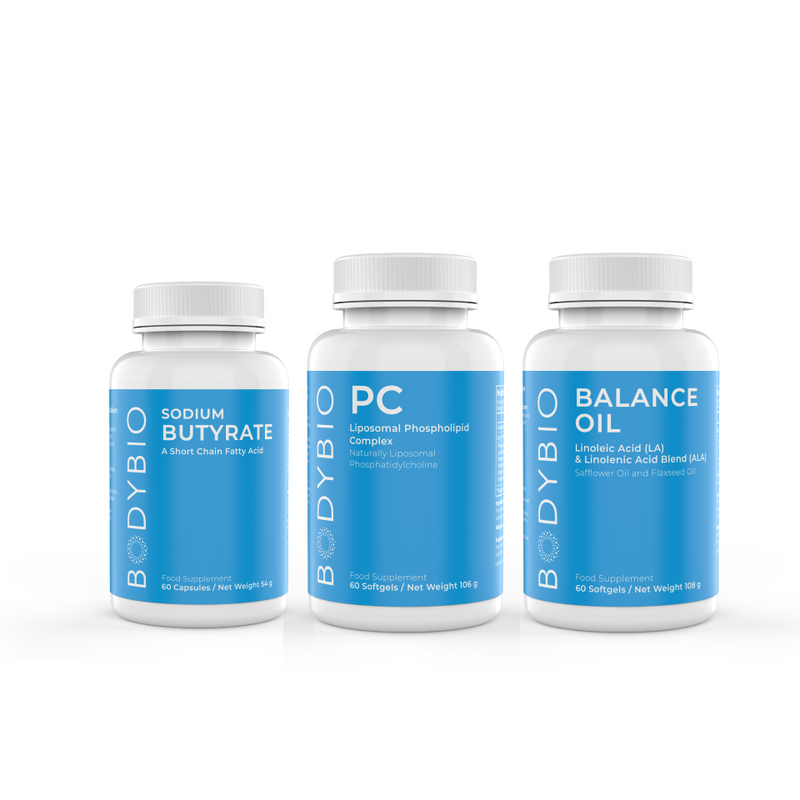Why Are Vitamins and Supplements Important?
Key Takeaways:
Key Points:
- The right vitamins and supplements help fill nutritional gaps and support cellular health, energy production, and overall well-being.
- Some supplements should not be taken together because they can interfere with absorption or counteract each other’s effects.
- Building a strong supplement foundation with essential nutrients like phosphatidylcholine, essential fatty acids, and electrolytes can improve long-term health and vitality.
Good health starts at the cellular level, and the right vitamins and supplements can play a crucial role in supporting your body’s functions. While a balanced diet provides essential nutrients, modern lifestyles, stress, and environmental factors often lead to deficiencies. That’s where targeted supplementation comes in — helping to fill gaps, enhance energy levels, and promote overall well-being. In this guide, we’ll explore the most important vitamins and minerals your body needs, how to choose the right supplements, and where to start when building a strong nutritional foundation.
Table of Contents:
- Why Are Vitamins and Supplements Important?
- Essential Vitamins and Minerals
- Other Important Nutrients
- How Do You Choose the Right Vitamins and Supplements?
-
Building Your Supplement Foundation
Why Are Vitamins and Supplements Important?
Your body is a complex network of cells that rely on proper nutrition to function at its best. While a well-balanced diet should provide essential vitamins and minerals, modern lifestyles, soil depletion, and dietary restrictions can lead to nutrient gaps. This is where supplements come in — filling in the missing pieces.
However, supplementation isn’t one-size-fits-all either. The key is to focus on foundational nutrients that support cellular integrity while tailoring any additional supplements to your individual health needs.
Many people assume that supplements are only necessary when there’s a deficiency, but in reality, they can help optimize performance, improve energy levels, and support healthy aging. For example, magnesium plays a critical role in over 300 biochemical reactions in the body, yet an estimated 50% of Americans do not get enough from their diet. Similarly, vitamin D deficiency is common due to limited sun exposure, especially in northern climates.
Supplements can also enhance overall well-being by supporting cognitive function, reducing general inflammation, and promoting gut health. A well-chosen supplement regimen can help counteract the effects of stress, poor sleep, and environmental toxins, all of which contribute to long-term health concerns. Understanding how vitamins and supplements work at the cellular level can help you make more informed choices about what your body truly needs.
Essential Vitamins and Minerals
Vitamins and minerals keep your body running smoothly. They help with everything from maintaining energy levels to supporting immune defense and brain function. While a balanced diet is the best source of these nutrients, modern food processing and a busy lifestyle can quickly lead to gaps. To ensure your body gets the support it needs, here’s a closer look at 13 key vitamins and essential minerals that contribute to overall well-being:
- Vitamin A: Necessary for vision, immune function, and skin health. Vitamin A is a fat-soluble vitamin that supports cellular growth and helps maintain mucosal barriers, your body's first line of defense against pathogens. Found in foods like liver, eggs, and carrots, vitamin A is fat-soluble, meaning it should be taken with healthy fats for better absorption.
- Vitamin B12: Essential for red blood cell production, nerve health, and energy metabolism, B12 is especially important for vegans and vegetarians, along with older adults who may struggle with absorption.
- Vitamin C: A powerhouse antioxidant, vitamin C supports immune function, collagen synthesis, hair growth, and cellular repair. It also plays a role in neurotransmitter production and iron absorption. While citrus fruits and bell peppers are great sources, supplementation can provide a more consistent dose. Liposomal vitamin C is a great alternative to regular vitamin C because it has greater absorption and bioavailability.*
- Vitamin D: Often called the "sunshine vitamin," vitamin D is vital for bone health, immune function, and mood regulation. It also supports calcium absorption, making it essential for maintaining strong bones. Most people are deficient, so supplementation is highly recommended, especially in winter months.
- Vitamin E: Acts as an antioxidant, protecting cells from oxidative stress. It also supports immune function and skin health. Found in nuts and seeds, vitamin E is best taken alongside a balanced intake of healthy fats.
- Vitamin K: Crucial for blood clotting and bone health. It works synergistically with vitamin D to regulate calcium metabolism. There are two forms — K1 (found in leafy greens) and K2 (found in fermented foods and animal products). K2 is particularly important for directing calcium to bones rather than arteries.
- Calcium: Essential for strong bones, muscle function, and nerve signaling. While dairy is a primary source, many people need supplementation, especially if they follow a dairy-free diet. Pairing calcium with vitamin D and magnesium enhances absorptions.
- Iron: Essential for oxygen transport in the blood and energy production. Women, athletes, and vegetarians often need additional iron, but too much iron can be harmful. In addition to iron supplementation, most people can benefit from cofactors such as B vitamins and vitamin C, which help with iron transport in the body to increase circulating levels.
- Zinc: Supports immune function, wound healing, and cellular repair. It’s also crucial for enzyme activity and hormone balance. Found in shellfish and seeds, zinc supplementation can help combat deficiencies, particularly in those with high stress or frequent illnesses.
- Magnesium: Involved in over 300 enzymatic reactions, supporting muscle relaxation, nerve function, and energy production. It also plays a role in sleep quality and stress management. Many people are deficient due to soil depletion, making supplementation highly beneficial.
- Folate (Vitamin B9): Essential for DNA synthesis, cell growth, and red blood cell production. It’s especially important for pregnant women. Folinic acid or methylated folate (5-MTHF) is the preferred form for better absorption. A vitamin B complex, like Vitamin B+, is an excellent source of vitamin B9.
Other Important Nutrients
- Fatty Acids: Support brain health, skin health, inflammation balance, and cardiovascular function. However, not everyone needs fish oil all the time. Instead, aim for a 4:1 omega-6 to omega-3 balance, using additional marine-derived omega-3s during times of increased inflammation, illness, or injury.*
- Probiotics: To support gut health and digestion, we typically recommend prioritizing fermented foods like kimchi and sauerkraut as your primary source of daily probiotics. In addition, we recommend postbiotics like Butyrate to deliver powerful gut-healing effects.
- CoQ10: Essential nutrient for mitochondrial energy production. It’s particularly beneficial for those taking statins, as these drugs can deplete CoQ10 levels.
How Do You Choose the Right Vitamins and Supplements?
Recommended Dietary Allowance
Your nutrient needs depend on age, sex, and health status. The Recommended Dietary Allowance (RDA) provides general guidelines to prevent deficiency, but optimal intake often varies based on individual factors like genetics and lifestyle.
Lifestyle
Your activity level, diet, and exposure to environmental toxins influence your supplement needs. For example, athletes may require more magnesium for muscle recovery, while those on plant-based diets may need extra B vitamins and key minerals to complement their diet.
Health Goals
Are you looking to boost immunity, improve digestion, or enhance cognitive function? Tailoring supplements to your goals ensures you're getting the right nutrients to support your body's needs.
Important Note: Be sure to double-check the supplements you bought previously and put away for a rainy day — expired vitamins may not be the healthiest choice for your cells!
Consult Your Doctor
While many supplements are beneficial, it's important to check with a healthcare professional before starting new ones — especially if you have existing health conditions or take medications.
Building Your Supplement Foundation
Supporting your body with the right nutrients is essential for overall health and well-being. A strong supplement foundation starts with key nutrients that help maintain balance and optimize function at the cellular level. Some core supplements to consider include:
- Phosphatidylcholine (PC): A crucial component of cell membranes that supports brain function, liver health, and overall cellular integrity.*
- Omega-3 and Omega-6 EFAs: Maintaining a healthy ratio of these essential fatty acids can help regulate inflammation and support heart and brain health.*
- Electrolytes: Essential for hydration, nerve function, and energy production, electrolytes play a vital role in muscle and cellular health.*
Once you have these foundational supplements in place, you can tailor your regimen based on your unique needs. Whether it’s additional vitamin D, a B complex, magnesium, or digestive enzymes, choosing the right supplements can help fill nutritional gaps and support your overall wellness goals. Taking a proactive approach to supplementation ensures that your body has the nutrients it needs to thrive in daily life.
Supplements You Shouldn’t Take Together
While supplements can provide numerous health benefits, some combinations can interfere with absorption, reduce effectiveness, or even cause unwanted side effects. Here are a few supplement pairings to avoid:
- Calcium and Iron: These minerals compete for absorption in the gut, which means taking them together can limit how much your body absorbs of each. If you truly need both, consider taking iron in the morning and calcium later in the day.
- Magnesium and Calcium: While both are essential minerals, taking high doses of magnesium and calcium at the same time may decrease their absorption. Magnesium can also act as a muscle relaxant, while calcium promotes muscle contraction, which can counteract each other’s effects.
- Zinc and Copper: These two minerals compete for absorption, and too much zinc can deplete copper levels over time. If taking both, consider spacing them out or using a balanced supplement that provides them in the proper ratio.
- Vitamin C and Vitamin B12: High doses of vitamin C can interfere with the absorption of vitamin B12. If supplementing with both, try taking vitamin C at a different time of day.
- Fish Oil and Blood Thinners: Omega-3 fatty acids in fish oil can have a blood-thinning effect, which can be problematic when combined with anticoagulant medications or high doses of vitamin E. If you take blood thinners, consult with a healthcare professional before adding fish oil to your routine.
Being mindful of these combinations can help you get the most out of your supplements while minimizing potential risks. Always check with a healthcare provider when adding new supplements to your routine, especially if you take medications or have underlying health conditions.
Strengthening Your Health with the Right Supplements
Choosing the right vitamins and supplements is a crucial step toward achieving optimal health. By focusing on essential nutrients that support cellular function, you can create a strong foundation for long-term wellness. Investing in your health today will pay off in vitality and longevity for years to come. By taking a proactive approach to your health, you set yourself up for a future of sustained energy, mental clarity, and resilience against illness. The best results come from a consistent and informed supplement regimen that evolves with your body’s needs over time.
Remember, supplementation should be personalized based on your diet, lifestyle, and individual health needs. With the right approach, you can bridge nutritional gaps and support your body’s ability to function at its best. Start with foundational supplements and adjust as needed to align with your specific health goals.
Brancaccio, M., Mennitti, C., Cesaro, A., Fimiani, F., Vano, M., Gargiulo, B., Caiazza, M., Amodio, F., Coto, I., D'Alicandro, G., Mazzaccara, C., Lombardo, B., Pero, R., Terracciano, D., Limongelli, G., Calabrò, P., D'Argenio, V., Frisso, G., & Scudiero, O. (2022). The Biological Role of Vitamins in Athletes' Muscle, Heart and Microbiota. International journal of environmental research and public health, 19(3), 1249. https://doi.org/10.3390/ijerph19031249
Campbell J. D. (2001). Lifestyle, minerals and health. Medical hypotheses, 57(5), 521–531. https://doi.org/10.1054/mehy.2001.1351
Forrest, K. Y., & Stuhldreher, W. L. (2011). Prevalence and correlates of vitamin D deficiency in US adults. Nutrition research (New York, N.Y.), 31(1), 48–54. https://doi.org/10.1016/j.nutres.2010.12.001
Hanna, M., Jaqua, E., Nguyen, V., & Clay, J. (2022). B Vitamins: Functions and Uses in Medicine. The Permanente journal, 26(2), 89–97. https://doi.org/10.7812/TPP/21.204
Haymes E. M. (1991). Vitamin and mineral supplementation to athletes. International journal of sport nutrition, 1(2), 146–169. https://doi.org/10.1123/ijsn.1.2.146
Hodgkinson, K., El Abbar, F., Dobranowski, P., Manoogian, J., Butcher, J., Figeys, D., Mack, D., & Stintzi, A. (2023). Butyrate's role in human health and the current progress towards its clinical application to treat gastrointestinal disease. Clinical Nutrition (Edinburgh, Scotland), 42(2), 61–75 . https://doi.org/10.1016/j.clnu.2022.10.024
Kennedy D. O. (2016). B Vitamins and the Brain: Mechanisms, Dose and Efficacy--A Review. Nutrients, 8(2), 68. https://doi.org/10.3390/nu8020068
Maggini, S., Óvári, V., Ferreres Giménez, I., & Pueyo Alamán, M. G. (2021). Benefits of micronutrient supplementation on nutritional status, energy metabolism, and subjective wellbeing. Beneficios de la suplementación con micronutrientes sobre el estado nutricional, el metabolismo energético y el bienestar subjetivo. Nutricion hospitalaria, 38(Spec No2), 3–8. https://doi.org/10.20960/nh.03788
Mitra, S., Paul, S., Roy, S., Sutradhar, H., Bin Emran, T., Nainu, F., Khandaker, M. U., Almalki, M., Wilairatana, P., & Mubarak, M. S. (2022). Exploring the Immune-Boosting Functions of Vitamins and Minerals as Nutritional Food Bioactive Compounds: A Comprehensive Review. Molecules (Basel, Switzerland), 27(2), 555. https://doi.org/10.3390/molecules27020555
Morris AL, Mohiuddin SS. Biochemistry, Nutrients. [Updated 2023 May 1]. In: StatPearls [Internet]. Treasure Island (FL): StatPearls Publishing; 2025 Jan-. Available from: https://www.ncbi.nlm.nih.gov/books/NBK554545/
Neufingerl, N., & Eilander, A. (2021). Nutrient Intake and Status in Adults Consuming Plant-Based Diets Compared to Meat-Eaters: A Systematic Review. Nutrients, 14(1), 29. https://doi.org/10.3390/nu14010029
Slywitch E, Savalli C, Duarte ACG, Escrivão MAMS. (2021). Iron deficiency in vegetarian and omnivorous individuals: analysis of 1340 individuals. Nutrients, 13(9), 2964. https://doi.org/10.3390/nu13092964
Stefanache, A., Lungu, I. I., Butnariu, I. A., Calin, G., Gutu, C., Marcu, C., Grierosu, C., Bogdan Goroftei, E. R., Duceac, L. D., Dabija, M. G., Popa, F., & Damir, D. (2023). Understanding How Minerals Contribute to Optimal Immune Function. Journal of immunology research, 2023, 3355733. https://doi.org/10.1155/2023/3355733
Tardy, A. L., Pouteau, E., Marquez, D., Yilmaz, C., & Scholey, A. (2020). Vitamins and Minerals for Energy, Fatigue and Cognition: A Narrative Review of the Biochemical and Clinical Evidence. Nutrients, 12(1), 228. https://doi.org/10.3390/nu12010228
Thirumdas, R., Kothakota, A., Pandiselvam, R., Bahrami, A., & Barba, F. J. (2021). Role of food nutrients and supplementation in fighting against viral infections and boosting immunity: A review. Trends in food science & technology, 110, 66–77. https://doi.org/10.1016/j.tifs.2021.01.069
Traber M. G. (2014). Vitamin E inadequacy in humans: causes and consequences. Advances in nutrition (Bethesda, Md.), 5(5), 503–514. https://doi.org/10.3945/an.114.006254
Vannice, G., & Rasmussen, H. (2014). Position of the academy of nutrition and dietetics: dietary fatty acids for healthy adults. Journal of the Academy of Nutrition and Dietetics, 114(1), 136–153. https://doi.org/10.1016/j.jand.2013.11.001 .
Wacker, M., & Holick, M. F. (2013). Sunlight and Vitamin D: A global perspective for health. Dermato-endocrinology, 5(1), 51–108. https://doi.org/10.4161/derm.24494
Zhang, Y., Zhou, W. E., Yan, J. Q., Liu, M., Zhou, Y., Shen, X., Ma, Y. L., Feng, X. S., Yang, J., & Li, G. H. (2018). A Review of the Extraction and Determination Methods of Thirteen Essential Vitamins to the Human Body: An Update from 2010. Molecules (Basel, Switzerland), 23(6), 1484. https://doi.org/10.3390/molecules23061484
Zhou, M. M., Xue, Y., Sun, S. H., Wen, M., Li, Z. J., Xu, J., Wang, J. F., Yanagita, T., Wang, Y. M., & Xue, C. H. (2016). Effects of different fatty acids composition of phosphatidylcholine on brain function of dementia mice induced by scopolamine. Lipids in health and disease, 15(1), 135. https://doi.org/10.1186/s12944-016-0305-5







